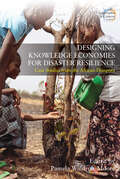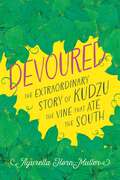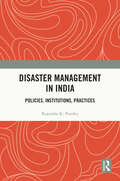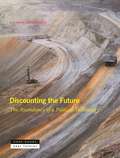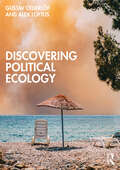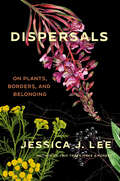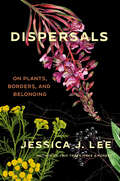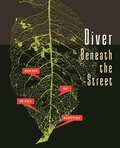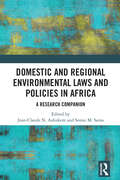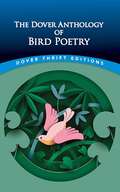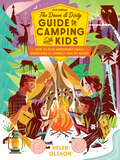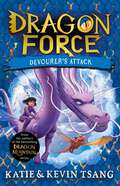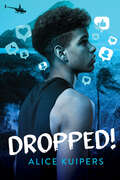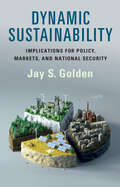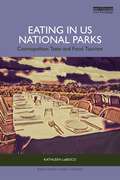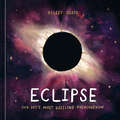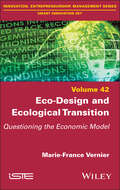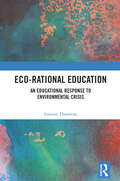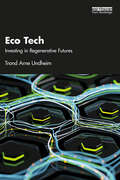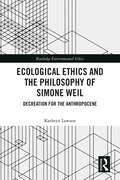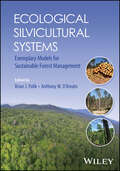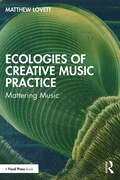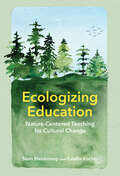- Table View
- List View
Designing Knowledge Economies for Disaster Resilience: Case Studies from the African Diaspora (Catastrophes in Context #7)
by Pamela Waldron-MooreDisaster research has been studied from many angles, seldom targeting its implications for vulnerable territories in Africa. Entities most subject to the effects of climate change are often undeveloped and located in disadvantaged regions. Post-disaster communities need to scrutinize the social, political, economic, and cultural structures that stagnate sustainable growth. Acknowledging that low economic development and high climate costs cannot coexist, this collected volume interrogates the challenge for disaster-prone territories to determine strategies for restructuring and redesigning their environment. This book proposes the creation of knowledge economies, whereby empowered communities may produce innovative knowledge translatable across the African diaspora.
Devoured: The Extraordinary Story of Kudzu, the Vine That Ate the South
by Ayurella Horn-MullerKudzu abounds across the American South. Introduced in the United States in the 1800s as a solution for soil erosion, this invasive vine with Eastern Asian origins came to be known as a pernicious invader capable of smothering everything in its path. To many, the plant’s enduring legacy has been its villainous role as the “vine that ate the South.” But for a select few, it has begun to signify something else entirely. In its roots, a network of people scattered across the country see a chance at redemption—and an opportunity to rewrite a fragment of troubled history.Devoured: The Extraordinary Story of Kudzu, the Vine That Ate the South detangles the complicated story of the South’s fickle relationship with kudzu, chronicling the ways the boundless weed has evolved over centuries, and dissecting what climate change could mean for its future across the United States. From architecture teams experimenting with it as a sustainable building material, to clinical applications treating binge-drinking, to chefs harvesting it as a wild edible, environmental journalist Ayurella Horn-Muller spotlights how kudzu’s notorious reputation in America is gradually being cast aside in favor of its promise.Weaving careful research with personal stories, Horn-Muller investigates how kudzu morphed from a miraculous agricultural solution to the monstrous archetypal foe of the southern landscape. Devoured is a poignant narrative of belonging, racial ambiguity, outsiders and insiders, and the path from universal acceptance to undesirability. It is a deeply reported exploration of the landscapes that host the many species we fight to control. Above all, Devoured is an ode to the earth around us—a quest for meaning in today’s imperiled world.
Die unsichtbaren Folgen des Extraktivismus: Ein Blick hinter die slow violence der chilenischen Bergbauindustrie (Energiepolitik und Klimaschutz. Energy Policy and Climate Protection)
by Anna LandherrDieses Open-Access-Buch beschäftigt sich mit Umweltproblemen, die selbst im Kontext der heutigen globalen ökologischen Krise weitgehend gesellschaftlich unsichtbar bleiben, da sie ihre oftmals schwerwiegenden sozial-ökologischen Auswirkungen allmählich, schleichend und über längere Zeiträume hinweg in Form einer slow violence (Rob Nixon) entfalten. Am Beispiel der toxischen Industrieabfälle (Tailings) der chilenischen Bergbauindustrie werden in der Untersuchung anhand von drei Fallstudien die zentralen Gründe und Dimensionen dieser Unsichtbarkeit dargestellt und ihr Zusammenspiel analysiert.
Disaster Management in India: Policies, Institutions, Practices
by Rajendra K. PandeyThis book explores policies, structures, and processes of disaster management in India examining key theoretical foundations of disaster management with practical illustrations and case studies. The book offers a comprehensive understanding of disaster management policies and practices in India and focuses on public policy approaches in addressing critical issues and challenges facing the machinery and processes of disaster management in India. The creative approach to deal with different aspects of disaster management has helped in holistic delineation of a number of critical themes such as legal frameworks of disaster management, good practices, use of innovative approaches and technology, multilateral cooperation, the role of civil society organisations, among others. This book will be of interest to the students and researchers working in the field of disaster studies, geography, geology, development studies, public administration, public policy, economics, and governance. It will also be an invaluable companion for policy makers, practitioners, academicians and development planners working in the area of disaster management.
Discounting the Future: The Ascendancy of a Political Technology
by Liliana DoganovaA pioneering exploration of the defining traits and contradictions of our relationship to the future through the lens of discountingForest fires, droughts, and rising sea levels beg a nagging question: have we lost our capacity to act on the future? Liliana Doganova&’s book sheds new light on this anxious query. It argues that our relationship to the future has been trapped in the gears of a device called discounting. While its incidence remains little known, discounting has long been entrenched in market and policy practices, shaping the ways firms and governments look to the future and make decisions accordingly. Thus, a sociological account of discounting formulas has become urgent.Discounting means valuing things through the flows of costs and benefits that they are likely to generate in the future, with these future flows being literally dis-counted as they are translated in the present. How have we come to think of the future, and of valuation, in such terms? Building on original empirical research in the historical sociology of discounting, Doganova takes us to some of the sites and moments in which discounting took shape and gained momentum: valuation of European forests in the eighteenth and nineteenth centuries; economic theories devised in the early 1900s; debates over business strategies in the postwar era; investor-state disputes over the nationalization of natural resources; and drug development in the biopharmaceutical industry today. Weaving these threads together, the book pleads for an understanding of discounting as a political technology, and of the future as a contested domain.
Discovering Political Ecology
by Gustav Cederlöf Alex LoftusPolitical ecology is one of the most vibrant fields of environmental research. This book introduces political ecology to a new generation of students in a daring new way: as an interdisciplinary approach to environmental research but also as a series of lived realities and a praxis for change. The origins of political ecology are often traced through an Anglo-American canon. In Discovering Political Ecology, Gustav Cederlöf and Alex Loftus instead take up the challenge of presenting the key conversations and the diverse traditions that have shaped this field with attention to its extensive international roots. Inspired by voices and research in Asia, Africa, Europe and the Americas, the authors address the concerns of those who from different social backgrounds have grown up in a world shaped by climate change and increasing environmental inequalities.Engaging and accessible in style, Discovering Political Ecology introduces a set of key concepts around which conversations in political ecology coalesce. It also shows how these concepts allow you to make sense of some of the most pressing issues of our time—issues around water, energy, agriculture, forestry, climate change and environmental justice. Each chapter includes learning outcomes and suggested further readings, extensive bibliographies and seminar activities to be used by students and educators. At the cutting edge of the field, the book will be of interest to those in all disciplines brought together in political ecology, including but not limited to anthropology, development studies, ecology, geography, history and political science.
Diskursive Dynamiken und Policy-Wandel in der EU-Energiepolitik: Eine Blended-Reading-Diskursanalyse des ordentlichen Gesetzgebungsverfahrens der EU von 1992 bis 2019 (Studien der NRW School of Governance)
by Tobias RammelWie lässt sich Policy-Wandel in der Europäischen Union erklären? Tobias Rammel beantwortet diese Frage erstmals für die Gesamtheit des ordentlichen Gesetzgebungsverfahrens zur EU-Energiepolitik von 1992 bis 2019 im Rahmen einer Blended-Reading-Diskursanalyse. Rekurrierend auf eine Analyse des Forschungsstandes zur EU-Energiepolitik wird in diesem Buch argumentiert, dass eine theoretische Synthese der Arbeiten zur Diskursanalyse und zum Policy-Wandel die bisherigen Defizite der klassischen Theorieschulen ausgleichen kann. Methodisch wird in einem innovativen dreistufigen Forschungsdesign auf eine Blended-Reading-Kombination von Close-Reading in Form von unüberwachten Text-Mining-Verfahren (Topic Modeling) zur induktiv-explorativen Vorstrukturierung der Analyse und Distant-Reading in Form einer qualitativen Feinanalyse zur Interpretation und Kontextualisierung der Daten zurückgegriffen. Damit liefert das Buch eine bislang einzigartige und differenzierte Erklärung für Policy-Wandel und die dazugehörigen diskursiven Dynamiken zwischen den EU-Institutionen im COD der EU-Energiepolitik von 1992 bis 2019.
Dispersals: On Plants, Borders, and Belonging
by Jessica J. LeeA prize-winning memoirist and nature writer turns to the lives of plants entangled in our human world to explore belonging, displacement, identity, and the truths of our shared futureA seed slips beyond a garden wall. A tree is planted on a precarious border. A shrub is stolen from its culture and its land. What happens when these plants leave their original homes and put down roots elsewhere?In fourteen essays, Dispersals explores the entanglements of the plant and human worlds: from species considered invasive, like giant hogweed; to those vilified but intimate, like soy; and those like kelp, on which our futures depend. Each of the plants considered in this collection are somehow perceived as being &‘out of place&’—weeds, samples collected through imperial science, crops introduced and transformed by our hand. Combining memoir, history, and scientific research in poetic prose, Jessica J. Lee meditates on the question of how both plants and people come to belong, why both cross borders, and how our futures are more entwined than we might imagine.
Dispersals: On Plants, Borders, and Belonging
by Jessica J. LeeINSTANT TORONTO STAR BESTSELLERThe prize-winning and bestselling author of Two Trees Make a Forest turns to the lives of plants entangled in our human world to explore belonging, displacement, identity, and the truths of our shared futureA seed slips beyond a garden wall. A tree is planted on a precarious border. A shrub is stolen from its culture and its land. What happens when these plants leave their original homes and put down roots elsewhere?The themes in these fourteen essays become invigorating and intimate in Lee&’s hands, centering on the lives of plants like seaweed, tangelos, and soy, and their entanglement with our human worlds. Lee explores the rich backstory of cherry trees in Berlin; a tea plant that grows in the Himalayan foothills just southwest of China; the world of algae and wakame, and the journeys they&’ve made to reach us.Each of the plants considered in this collection are somehow perceived as being &“out of place&”—weeds, samples collected through imperial science, crops introduced and transformed by our hand. Lee looks at these plant species in their own context, even when we find them outside of it.Dispersals draws a gorgeous, sprawling map of the diaspora of flora. Combining memoir, history, and scientific research in poetic prose, Jessica J. Lee meditates on the question of how both plants and people come to belong, why both cross borders, and how our futures are more entwined than we might imagine.
Diver Beneath the Street (Made in Michigan Writers Series)
by Petra KuppersA decaying psychogeography unfurls the landscapes of the 1967–69 Michigan Murders, the 2019 Detroit serial killer, and the COVID-19 lockdown in this visceral poetry collection. Author, performance artist, and disability culture activist Petra Kuppers dissects traces of violence in the richness of the soil while honoring lost community members. Dynamic and somatic poems traverse the realms of urban space, wild rivers, and the hinterlands of suburbia, glimpsing the decay of bodies, houses, carpets, hair, and bones by way of ecopoetry. Poems like "Reintegration" and "Earth Séance" delve into cycles of decomposition and decreasing biodiversity across the micro- and macroworlds. Others such as "Dancing Princesses" tie timeless fairy-tale tropes of violence toward women to modern murders and lived experience. Moments in lockdown are embodied through somatic exploration of nature and self in works like "Dear White Pine in My Garden." This evocative entanglement of life and death, joy and horror, natural and artificial processes and particles offers an intriguing lyrical and poetic quality as well as unique perspectives through the lenses of feminist, queer, and disability studies.
Domestic and Regional Environmental Laws and Policies in Africa: A Research Companion
by Jean-Claude N. Ashukem Semie M. SamaThis book explores African domestic and regional responses and approaches to environmental protection and sustainability. Written by African experts, the collection consists of five parts covering the whole of Africa. It provides broad coverage of specific themes, including environmental constitutionalism, climate change, gender and the environment, wildlife trade, environmental justice, and human displacement. The key aims are first, to explore theoretical and empirical studies to interrogate and provide clarity on academic discourse on how and whether environmental human rights approaches and policy implications have effectively enhanced environmental protection and sustainability at African domestic levels. Second, to investigate and present innovative solutions on how African domestic legal regimes deal with environmental justice, natural resources governance, refugees’ environmental rights, and climate-induced displaced persons. Finally, to propose innovative legal and institutionalised solutions to Africa’s ecological realities by determining the legal and regulatory gaps on environmental human rights issues on the continent. The collection will be a valuable resource for researchers, academics, and policymakers in human rights law, environmental law, political science, ecology and conservation, environmental management, disaster management, and development studies.
The Dover Anthology of Bird Poetry (Dover Thrift Editions: Poetry)
by Heidi GagnonPoets have long treated birds as a captivating source of inspiration as metaphors, references, and symbols of death, eternity, life, love, power, religious beliefs, and superstitions. Others have used different types of birds to express their thoughts and emotions. This volume highlights these remarkable creatures as they take flight from the Elizabethan era through the twentieth century. Selections from classic to contemporary authors include poems by William Blake, Emily Dickinson, John Keats, Herman Melville, Edgar Allan Poe, Wallace Stevens, William Carlos Williams, William Butler Yeats, and others. This anthology is ideal for classroom use, independent study, and personal perusal.
The Down and Dirty Guide to Camping with Kids: How to Plan Memorable Family Adventures and Connect Kids to Nature
by Helen OlssonPlan your family camping adventure! Whether you&’re a first-time camper or a veteran backpacker befuddled by the challenges of carting a brood—and all the requisite gear—into the great outdoors, here you&’ll find all the tips and tools you need to plan the perfect nature adventure with your family. Humorous and irreverent, yet always authoritative, this guide to camping with kids, from babies through pre-teens, is filled with checklists, smart tips, recipes, games, activities, and art projects. Helen Olsson, a seasoned camper and mother of three, shares lessons learned over the years of nature outings with her own family. Learn the basics of family camping, from choosing a destination and packing gear to setting up a campsite and keeping little ones safe. Create the perfect camp menu with simple and tasty recipe ideas. Discover foolproof tips and tactics for keeping kids happy and entertained while hiking. Explore nature through clever and creative camp arts and craft projects. This guide is your game plan to unplugging from the digital world and connecting your kids to nature. Whether it&’s roasting marshmallows around a crackling campfire or stretching out on a camp mat to gaze at the stars, the memories you&’ll be making will last a lifetime.
Dragon Force: Devourer's Attack (Dragon Force #2)
by Katie Tsang Kevin TsangFrom the authors of the bestselling DRAGON MOUNTAIN comes the Dragon Force series! Leap into the second title in this edge-of-your-seat, dragon-obsessed adventure series for 8+ readers. WHEN DANGER CALLS, THE DRAGON FORCE ANSWER... It&’s a dream come true for Lance Lo and his sister Zoe to be at Camp Claw, training for the elite Dragon Force to help protect the world. But with the core members captured by the evil Devourer, they soon find themselves taking on their most dangerous mission yet. Can they rescue the rest of the team from a creature who will do anything to feed his appetite for magic. . . ?Praise for DRAGON MOUNTAIN: 'Splendidly addictive' – Guardian 'Rollicking, escapist storytelling with a dragon-sized heart' – Kiran Millwood Hargrave, author of THE GIRL OF INK AND STARS 'A soaring, sizzling, fire-breathing gem of an adventure story' – Abi Elphinstone, bestselling author of SKY SONG 'Packed full of fun, heart and imagination, it will make you wish you had your own dragon bond' – Anna James, author of the PAGES & CO. series 'A wonderful warm-hearted and action-packed adventure' – Katherine Woodfine, author of THE SINCLAIR'S MYSTERIES 'Brimming with warmth and originality, DRAGON MOUNTAIN combines edge-of-your-seat adventure, laugh-out-loud humour and hugely exciting dragons to create a sweeping fantasy that will captivate readers of all ages.&’ – Catherine Doyle, author of THE STORM KEEPER&’S ISLAND 'DRAGON MOUNTAIN has all of my favourite things! A rich mythology and a tale of friendship, snarky dragons and daring deeds...this is the kind of breathless tale that leaves you hungry for the next instalment' – Roshani Chokshi, author of the ARU SHAH series &‘DRAGON MOUNTAIN is a joy to read – adventurous and enchanting, with a heart of gold. It will make you re-live the moment you first looked at the sky and longed to see a dragon looking back&’ – Samantha Shannon, author of THE PRIORY OF THE ORANGE TREE and THE BONE SEASON series
Dropped! (Orca Anchor)
by Alice KuipersDex is dropped onto a deserted tropical island to be a player in a social media competition. Dex is one of six contestants on Dropped!, an internet reality show. He’s glad to escape his real life after being dumped by his girlfriend, Lola, and destroying his social life. He and the other contenders have to spend five days on a deserted island, and the person who gains the most likes and followers will be the winner. The prize is a ton of money and status as an influencer. Keeping people watching is the challenge, and Dex will do whatever it takes. He needs to win—it’s the only way to get Lola and his popularity back. But on the island, away from his ex, he finds himself flirting with the gorgeous and popular Amina. When Dex keeps placing behind Amina, he realizes he has to be more daring to get the engagements he needs. But how extreme will he need to be? And is it worth it to win?
Eating in US National Parks: Cosmopolitan Taste and Food Tourism (Routledge Food Studies)
by Kathleen LeBescoThis book presents a fascinating exploration of eating experiences within US national parks, explaining how, on what, and why people eat in national parks and how this has changed over the last century. National parks are enjoying unprecedented popularity, and they are especially popular sites for the expression of cosmopolitanism, an ideological outlook descended from the Romantics on whose vision the parks were originally founded. The book explores the constructed foodscape within US national parks, situating the romantic consumption ethos within the context of sociological work on distinction, culinary tourism, and culinary capital. It analyzes and problematizes elements of cosmopolitan taste and desire, examining food tourism in wilderness spaces that satisfies cosmopolitan hunger for authenticity and a certain type of self-making. Weaving together strands of research that have not been previously integrated, the book gleans meaning from concessions menus and park restaurant web pages and employs audience analysis to take stock of park restaurant visitors’ contributions to restaurant review websites, as well as to understand how they represent their park eating experiences on social media. The book examines how satisfying cosmopolitan tastes in the parks creates profit for corporate concessioners, but also may produce bioregionalist successes and a recentering of Indigenous foodways. It concludes by exploring inroads to a better food experience in the parks, involving food products and processes that are regionally/locally specific, where tourists witness and participate in food production and enjoy commensality, but that are also non-extractive and show care for the environment and the people who inhabit it. This book will be of great interest to students and scholars of food studies, tourism and hospitality, sociology of culture, parks and recreation, American studies, and environmental studies. The book will also be of interest to parks and recreation decision makers, sustainable tourism leaders, and hospitality managers.
Eclipse: Our Sky's Most Dazzling Phenomenon
by Kelsey OseidDiscover the ancient myths and fascinating science of the world&’s most striking celestial phenomena—eclipses—in this educational, beautifully illustrated guide by the acclaimed author of What We See in the Stars.Awe-inspiring, majestic, and always a little otherworldly, eclipses have captivated our imaginations for thousands of years. Whether plunged into darkness as the sun disappears in the middle of the day or enchanted by the moon&’s blood red glow as a vast shadow creeps across its surface, our ancestors both feared and revered eclipses, seeking to understand these striking celestial events through both storytelling and science.In Eclipse, celebrated artist and author Kelsey Oseid explores the science and mystique of lunar and solar eclipses, from the myths of our ancestors to today. Did you know that in Chinese legends, solar eclipses were caused by dragons eating the sun? Or that the Norse people believed that a sky wolf chased away the moon? Oseid presents these rich historical stories alongside informative, accessible science to enrich your understanding: a solar eclipse only occurs during a new moon; a selenelion is when you can see the lunar eclipse in front of you and the sunset behind you; and the Mars Rovers have even taken photographs of eclipses from Mars.Filled with captivating information and vivid, colorful illustrations, Eclipse will delight and inspire astronomy lovers of all ages.
Eco-Design and Ecological Transition: Questioning the Economic Model
by Marie-France VernierSuccessive IPCC reports consistently stress the devastating impact of human activity on the climate. An ecological transition seems essential to modify our economic and social system, while meeting the needs of current and future generations. As the main culprits of environmental destruction, companies must modify their production methods to reduce their negative impact on the environment. Eco Design and Ecological Transition presents an innovative approach to eco design, a method that aims to offer products or services with a reduced environmental impact compared to conventional production methods, from the extraction of resources to the end of the product’s life. The book also analyzes the potential of the circular economy and frugal innovation. It shows that innovation, to be sustainable, must be both environmentally and socially sustainable. From a systemic point of view, it examines the ability of players, particularly companies, to change their strategies in order to combine human well-being and respect for the environment in the context of ecological transition.
Eco-Rational Education: An Educational Response to Environmental Crisis
by Simone ThorntonEco-Rational Education proposes an educational response to climate change, environmental degradation, and human relations to ecology through the delivery of critical land-responsive environmental education. The book argues that education is a powerful vehicle for both social change and cultural reproduction. It proposes that the prioritisation and integration of environmental education across the curriculum is essential to the development of ecologically rational citizens capable of responding to the environmental crisis and an increasingly changing world. Using philosophical analysis, particularly environmental philosophy, pragmatism, and ecofeminism, the book develops an understanding of contemporary issues in education, especially inquiry-based learning as pedagogy, diversifying knowledge, environmental and epistemic justice, climate change education, and citizenship education. Eco-Rational Education will be of interest to researchers and post-graduate students of social and political philosophy, educational philosophy, as well as environmental, ethics and teacher education.
Eco Tech: Investing in Regenerative Futures
by Trond UndheimThe book is a seminal contribution from a leading futurist who, over the past three decades, has explored each of the most disruptive forces shaping our world today, including emerging technologies, entrepreneurship, venture investments, and industrial manufacturing. Eco Tech brings all this thinking together, fusing insight from thought leaders with the author’s own considerable experience, to explore scenarios for 2050 and discuss eco-effectiveness as an established practice for governments, corporations, startups, and individuals. Trond Arne Undheim begins by providing a brief history of sustainability and provides simple definitions for key terms including eco-efficiency, life cycle analysis, industrial ecology, cleantech, net zero, climate change, biodiversity, and carbon capture, which will enable the reader to engage confidently in eco-discussions. Undheim also explores the ambitions of regeneration and offers a new conceptual framework to facilitate future discussion around sustainable innovation. He applies this framework to green, ambitious start-ups and examines the way these ventures will lead the way towards an eco-effective society, drawing on stories from exciting founders who are already changing the world. Finally, the book takes a deep dive into emerging eco-innovations, including batteries, bioplastics, distributed energy, space tech, and futuristic megaprojects. The book contains clear directions on how to progress through adversity and avoid returning to the status quo. The book will be an essential guide for executives, sustainability professionals, and energy tech investors who are deeply concerned with the future and are prepared to both significantly invest in it and make behavioral changes to foster regenerative development. It will also be a great resource for students and scholars of sustainable investing and innovation.
Ecological Ethics and the Philosophy of Simone Weil: Decreation for the Anthropocene (Routledge Environmental Ethics)
by Kathryn LawsonThis book places the philosophy of Simone Weil into conversation with contemporary environmental concerns in the Anthropocene.The book offers a systematic interpretation of Simone Weil, making her ethical philosophy more accessible to non-Weil scholars. Weil’s work has been influential in many fields, including politically and theologically-based critiques of social inequalities and suffering, but rarely linked to ecology. Kathryn Lawson argues that Weil’s work can be understood as offering a coherent approach with potentially widespread appeal applicable to our ethical relations to much more than just other human beings. She suggests that the process of "decreation" in Weil is an expansion of the self which might also come to include the surrounding earth and a vast assemblage of others. This allows readers to consider what it means to be human in this time and place, and to contemplate our ethical responsibilities both to other humans and also to the more-than-human world. Ultimately, the book uses Weil’s thought to decanter the human being by cultivating human actions towards an ecological ethics.This book will be useful for Simone Weil scholars and academics, as well as students and researchers interested in environmental ethics in departments of comparative literature, theory and criticism, philosophy, and environmental studies.
Ecological Silvicultural Systems: Exemplary Models for Sustainable Forest Management
by Brian J. Palik Anthony W. D’AmatoECOLOGICAL SILVICULTURAL SYSTEMS Unleash the natural power and adaptability of forests with this cutting-edge guide For generations, silvicultural systems have focused largely on models whose primary objective is the production of timber, leading to drastically simplified forests with reduced ecological richness, diversity, and complexity. Ecological silviculture, by contrast, focuses on producing and maintaining forests with “all their parts”—, that is, with the diversity and flexibility to respond and adapt to global changes. Ecological silviculture seeks to emulate natural development models and sustain healthy forests serving multiple values and goals. Ecological Silvicultural Systems provides a comprehensive introduction to these approaches and their benefits tailored to diverse types of forests, designed for forest management professionals. It provides a series of exemplary models for ecological silviculture and surveys the resulting forest ecosystems. The result is a text that meets the needs of professionals in forestry and natural resource management with an eye towards sustaining healthy forest ecosystems, adapting them to climate change, protecting them from invasive species, and responding to changing market forces. Ecological Silvicultural Systems readers will also find: Detailed treatment of forest ecosystems in North America, Europe, South America, and Australia A broad field of contributors with decades of combined expertise on multiple continents Discussion of pine woodlands; temperate hardwood forests, boreal forests, temperate rainforests, and more Ecological Silvicultural Systems is a useful reference for professional foresters, wildlife habitat managers, restoration ecologists, and undergraduate and graduate students in any of these fields.
Ecologies of Creative Music Practice: Mattering Music
by Matthew LovettEcologies of Creative Music Practice: Mattering Music explores music as a dynamic practice embedded in contemporary ecological contexts, one that both responds to, and creates change within, the ecologies in which it is created and consumed. This highly interdisciplinary analysis includes theoretical and practical considerations – from blockchain technology and digital platform commerce to artificial intelligence and the future of work, to sustainability and political ecology – as well as contemporary philosophical paradigms, guiding its investigation through three main lenses: How can music work as a conceptual tool to interrogate and respond to our changing global environment? How have transformations in our digital environment affected how we produce, distribute and consume music? How does music relate to matters of political ecology and environmental change? Within this framework, music is positioned as a starting point from which to examine a range of contexts and environments, offering new perspectives on contemporary technological and ecological discourse. Ecologies of Creative Music Practice: Mattering Music is a valuable text for advanced undergraduates, postgraduates, researchers and practitioners concerned with producing, performing, sharing and listening to music.
Ecologizing Education: Nature-Centered Teaching for Cultural Change
by Sean Blenkinsop Estella C. KuchtaEcologizing Education explores how we can reenvision education to meet the demands of an unjust and rapidly changing world. Going beyond "green" schooling programs that aim only to shape behavior, Sean Blenkinsop and Estella Kuchta advance a pedagogical approach that seeks to instills eco-conscious and socially just change at the cultural level. Ecologizing education, as this approach is called, involves identifying and working to overcome anti-ecological features of contemporary education. This approach, called ecologizing education, aims to develop a classroom culture in sync with the more-than-human world where diversity and interdependency are intrinsic.Blenkinsop and Kuchta illustrate this educational paradigm shift through the real-world stories of two public elementary schools located in British Columbia. They show that this approach to learning starts with recognizing the environmental and social injustices that pervade our industrialized societies. By documenting how ecologizing education helps children create new relationships with the natural world and move toward mutual healing, Blenkinsop and Kuchta offer a roadmap for what may be the most potent chance we have at meaningful change in the face of myriad climate crises. Timely, practical, and ultimately inspirational, Ecologizing Education is vital reading for any parent, caregiver, environmentalist, or educator looking for wholistic education that places nature and the environment front and center.
